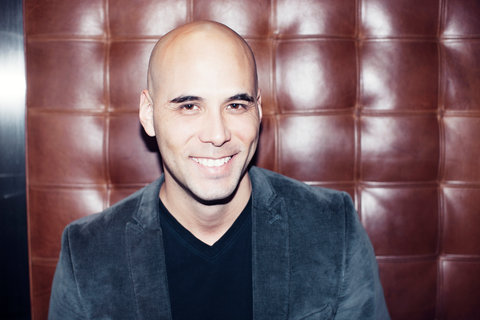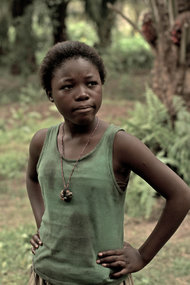
If the Academy Awards were like some Olympic events and took degree of difficulty into account, Kim Nguyen’s “War Witch,” one of the five nominees for the Oscar for best foreign-language film, would
surely be awarded extra points. A decade in the making, “War Witch,” which represents Canada, was researched and filmed in some of the most troubled parts of Africa and addresses one of that continent’s
most heartbreaking problems: the violent conscription of child soldiers.

Foreign Language Films
Watching the race for the Academy Award for best foreign-language film. Read More »
“War Witch,” which opens March 1, is essentially the story of the hardships endured by the 12-year-old Komona, played by Rachel Mwanza. After being kidnapped by rebel soldiers — the original French-language title of the movie is “Rebelle” — she is enslaved and sexually exploited by her captors, her destiny changing only after they come to believe that she has magical powers.

Mr. Nguyen, 38, is a native of Montreal who studied film there; his father was a Vietnamese economist who emigrated to Quebec in the early 1960s. “War Witch” is his fourth feature and the first to earn an Oscar nomination. It also won best narrative feature last year at the Tribeca Film Festival. In Los Angeles for Oscar-related events, he spoke by telephone on Tuesday about the unusual challenges he faced in making “War Witch.” Here are edited excerpts from that conversation:
Your film has an interesting mix of professional and nonprofessional actors, with your title character and her love interest both in the latter category. How did you find Rachel Mwanza?
We did an open casting in Kinshasa. We had the hunch that kids from the streets could be very powerful. There was this Belgian documentary made before our film, and the people who did that kept telling us about this girl, Rachel Mwanza, who had real natural talent. So we did find amazing actors, but we also relied on that suggestion, and when we saw her, she was just mesmerizing. She had this natural instinct for acting, which I guess was nourished by her difficult past.
What did that encompass?
At 5 or 6 years old, she was abandoned by her parents. She lived with her grandmother for a while, but then her grandmother told Rachel, “Well, I can’t provide for you, you’ll have a better chance of surviving if you go on the streets.” So that’s what she did, and when she found us, she was living on the streets of Kinshasa.
It’s always said that it’s hard to direct children, but in this case I imagine it must be even tougher, because she’s used to living on her own without adult supervision and making her own rules. Did she have difficulty in adapting to the discipline required to make a film?
Yeah, she did. Everything about structure was a challenge for Rachel. It was a struggle, but mostly it was the biggest blessing ever. These kids, they weren’t jaded by auditions and people telling them they should be prettier, you should get botox, whatever. They were just free.
You know, often when you are working with professional actors, one of the hardest things to do is just get them to find their true being that reflects the character they are playing. In Rachel’s case, who she is in real life permeates through the character she is interpreting.
Even though “War Witch” was shot in the Democratic Republic of Congo, you never say so explicitly. The country you show is a kind of a generic sub-Saharan African country in turmoil. Why did you do it that way?
Because the film is a fiction. It’s not Congo’s reality, it’s a construction of several different realities. Most of the things you see in the film are things I have read about, that are slightly twisted but are true in their principles. But since I transformed so many of these things, I couldn’t give a name to the place where I was filming. It wouldn’t have been responsible to do so.
The DRC is often regarded as the quintessential failed state, where services and infrastructure simply do not work. What was it like making a movie in that environment?
Really, it was a logistics nightmare and really, really tough on my crew. We had a logistics manager who had done military service in France. The movie really couldn’t have existed without him. It wasn’t just security issues, going from one place to the other, having protective guards to go to certain places. It was all really very complex.
I can remember coming back from Mobutu’s forbidden city, which he built it in the ’80s with the money from copper and uranium. We had like 40 vehicles and an armed convoy in front of us with AK-47s, just to make sure we would be O.K. Security had to be really, really tight.
We’re talking the day after the Oscar nominees luncheon, for which you flew to Los Angeles from Montreal. Can I get your impressions of that event?
It’s almost not real to be there with all these amazing people that you respect, like Steven Spielberg. I was sitting next to Michael Mann, and Kathryn Bigelow was at the next table and she said to me, “Oh, you’re the one who directed ‘War Witch.’ I have to see that film, I’ve heard a lot of good things about it.” And shaking hands with Robert De Niro! You come out of the nominees luncheon and it’s like, “Wow, what just happened?” It does feel weird.
What’s your philosophy of dealing with the whole Oscar whirl and process?
One of my colleagues in Paris told me, “Kim, you know that most likely this only happens once in your life, that you’re a nominee in the foreign-language category.” The conjunction that your country decides that your film should be it, that you get into A-list film festivals, that you get onto the list of 71 and then the short list and then a nomination. That all these things align themselves is so rare. He said, “You might make a better film, but for you to end up on that list, it is really, really rare that it happens.” So I’m just enjoying it and am really proud to be part of this team.
What’s the magic ingredient in the water up there in Quebec? This is the third year in a row a French Canadian film has been nominated for the foreign-language Oscar. That’s pretty impressive.
We even thought that it was something that might go against us, that there had already been two films previous to ours among the nominees. And this year, there were just some amazing films in the world, so we didn’t have any expectations.
Have you talked with the directors of “Monsieur Lazhar” and “Incendies” to get some advice on how to handle being in this situation?
Of course. Philippe (Falardeau) and Denis (Villeneuve) told me two things: that 50 percent of it is about having made a good film, and the other 50 percent is about having had a bowl of Lucky Charms cereal on the morning they announce the nominees. So you know what? I had a bowl of Lucky Charms that morning, and it worked. (Laughs) But only Quebecers can use that trick; it won’t work for anyone else.
